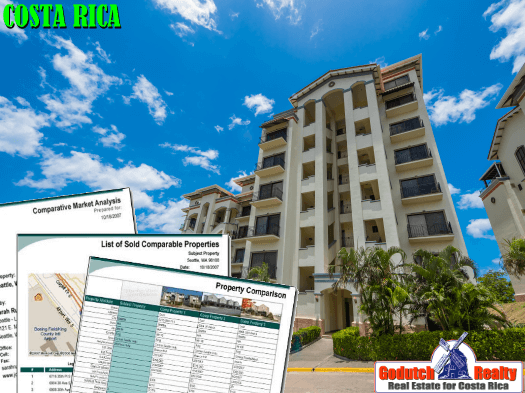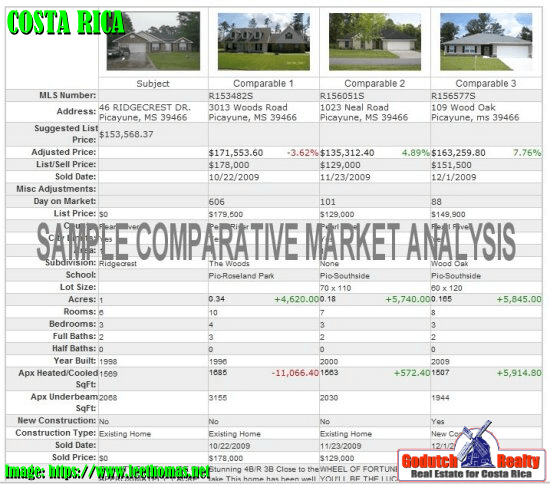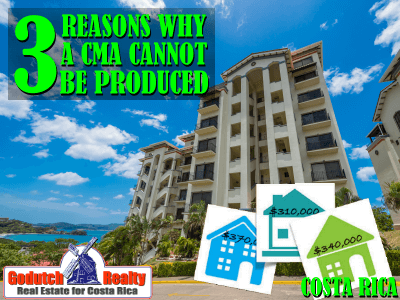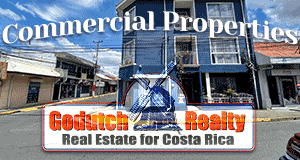Those used to the North American real estate market, always want to know if we can produce a CMA. For those who don’t know what that is, this is a Comparative Market Analysis.
In Costa Rica real estate, it is impossible to produce a CMA for various reasons.
At least for now, it is not possible for a real estate agent to produce a to determine a more realistic value for a property. Although the National Register and the Capital Gains – Ganancias de Capital – law are changing things a bit.
This is an amazing tool for both sellers and buyers. But unfortunately, our legal system and property registry don’t allow us to use this too yet. Therefore, often properties are priced too high and sit on the market for years. A CMA can give sellers a much better idea of the value of their property.
In 1985, law 6999 of the property transfer tax was created and modified by law 9069 in 2012. Customarily, the value of the property used to transfer the property title to the new owner has always been just a little over the old registered value. If a property was sold 25 years ago for the last time, the registered value was usually a ridiculously low amount, which is how buyers, sellers, and closing attorneys played the system.

Let me explain why we cannot produce a CMA in Costa Rica,
1. County Records
Unlike some other countries around the world, we don’t have publicly accessible records organized by neighborhood and street. Every 5 years, property owners in Costa Rica have to declare the value of their property at the municipality. Nonetheless, if you request the information of a certain property or a whole neighborhood, they will not release it to you.
All property records, country-wide, are kept at the National Register. You can find the information on a property if you know the name or identification number of the owner, or the property number. You can do this search online or physically.
But again, this will give you only give you one property, and not a list of properties in a neighborhood and their values. Producing a CMA without any of these data is not possible.
2. Registered Sales Price
Until 2019, buyers asked their lawyer to register the sales price at a lower value than the real purchase price. This was done so buyers could pay a lower transfer tax.
Often, buyers would just take over the corporation that owned the property. That way, the purchase/sale was not visible in the property register.
In the past, real estate developers created corporations for each new condominium and then transfer the shares of the corporation to the buyers and there was no property title transfer. Many of the condominiums in Costa Rica were handled this way and the government never saw a dime on any of these property sales.
Therefore, most registered values are incorrect at the property register. Again, the capital gains law changed this behavior.
Not until now, in 2021, the sales price of a property in Costa Rica is registered correctly in the National Register. Money laundering laws have obliged notary publics to start registering the sale of a property at the real price.
For this reason, most property values in the National Register cannot be used for a CMA.

3. Comparable homes hardly exist
Real estate developers did not master-plan neighborhoods before 2006, except for a few subdivision. Large development companies that purchase large acreage to build subdivisions with streets, schools, a shopping center, or a country club, didn’t exist at the time. Every house in Costa Rica is different in size, layout, and finishes unless it’s in a condominium. So houses do not compare to any others.
Real estate developers sold subdivisions as building lots only. Then each buyer would design his own home or hire an architect or engineer. During the real estate boom of 2006, larger developers started building gated communities or condominiums as we call them in Costa Rica. Those condominiums have anywhere between 5 and 50 cookie-cutter homes with a common entrance and common areas like a swimming pool and sometimes a gym and tennis court. Sellers transferred these homes mainly to the buyers through corporations, as described above.
The volume of the transactions
To have statistics, you need a volume of transactions and someone to create those statistics, usually a real estate board. Costa Rica is a very small country and has a population that is just a bit less than the population of the South Florida Metropolitan area (Miami – Fort Lauderdale – West Palm Beach). Fort Lauderdale has over 9,000 properties for sale on Trulia only right now (February 2014). While our own American European real estate group has only 1,400 active listings from coast to coast at the same time.
An informal market
Having a real estate license to sell properties professionally is not mandatory in Costa Rica. Selling real estate in Costa Rica is a very informal profession. Probably 96% of the real estate agents here are not connected to any real estate board or an MLS. Buyers and agents don’t have direct access to real estate data of what is for sale, what was sold, and at what price. With the new money-laundering laws in Costa Rica, where real estate agents have to be registered with the SUGEF, it’s possible that soon there is a change in the formalization of the real estate market.
Then How?
So how do real estate agents in Costa Rica get to the value of a property? How do they calculate a market value for a property?
Some agents ask the seller how much they want for their property and list it at that price. Nonetheless, professional and expert agents use replacement value to determine the value of a property for sale. Even professional bank appraisers have trouble setting a market value on a property.
All three mentioned reasons are basically about the fact that most of the data for a complete Comparative Market Analysis are missing. A CMA won’t become reality until real estate licensing becomes mandatory and the market gets organized. So for now, if you want to know more about property prices in the area, contact your GoDutch Realty agent. We are the experts.























